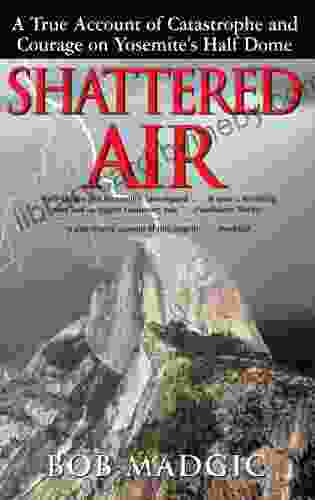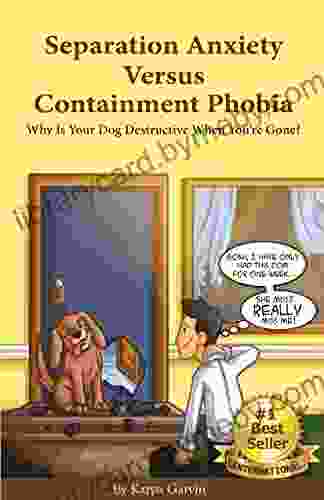Separation Anxiety Versus Containment Phobia: Understanding the Differences and Treatment Options

Separation anxiety and containment phobia are two distinct anxiety disFree Downloads that can affect dogs. While both disFree Downloads share some similarities, there are also some key differences. This article will discuss the differences between separation anxiety and containment phobia, as well as the treatment options for each disFree Download.
Separation anxiety is a disFree Download that occurs when a dog becomes excessively anxious when separated from its owner or caregiver. Dogs with separation anxiety may exhibit a variety of symptoms, including:
- Barking or howling excessively when left alone
- Whining or crying when left alone
- Pacing or circling when left alone
- Chewing or destroying furniture or other objects when left alone
- Urinating or defecating in the house when left alone
Separation anxiety can be caused by a variety of factors, including:
4.5 out of 5
| Language | : | English |
| File size | : | 2851 KB |
| Text-to-Speech | : | Enabled |
| Screen Reader | : | Supported |
| Enhanced typesetting | : | Enabled |
| Word Wise | : | Enabled |
| Print length | : | 154 pages |
| Lending | : | Enabled |
- A history of being abandoned or left alone for long periods of time
- A change in routine, such as a new job or school schedule
- A move to a new home
- The death of a family member or pet
Containment phobia is a disFree Download that occurs when a dog becomes excessively anxious when confined to a small space. Dogs with containment phobia may exhibit a variety of symptoms, including:
- Barking or howling when confined to a crate, kennel, or other small space
- Whining or crying when confined to a crate, kennel, or other small space
- Pacing or circling when confined to a crate, kennel, or other small space
- Trying to escape from a crate, kennel, or other small space
- Urinating or defecating in a crate, kennel, or other small space
Containment phobia can be caused by a variety of factors, including:
- A history of being punished or abused while confined to a small space
- A fear of being trapped or enclosed
- A history of being left alone in a crate or kennel for long periods of time
The treatment of separation anxiety and containment phobia typically involves a combination of behavioral modification and medication. Behavioral modification techniques can help to teach dogs how to cope with being separated from their owners or caregivers and how to tolerate being confined to small spaces. Medication can help to reduce anxiety and make behavioral modification techniques more effective.
There are a variety of behavioral modification techniques that can be used to treat separation anxiety and containment phobia. Some of the most effective techniques include:
- Desensitization and counterconditioning: This technique involves gradually exposing dogs to the situations that trigger their anxiety and then pairing those situations with positive experiences. For example, a dog with separation anxiety might be gradually exposed to being left alone for short periods of time while their owner is in the house. The dog would then be given treats or praise for staying calm and relaxed.
- Crate training: Crate training can be a helpful way to manage separation anxiety and containment phobia. When used correctly, a crate can provide dogs with a safe and secure place to relax. Crate training should be done gradually and positively.
- Exercise and play: Exercise and play can help to reduce anxiety and improve overall behavior in dogs. Dogs with separation anxiety and containment phobia should be given plenty of opportunities to exercise and play each day.
Medication can be an effective treatment for separation anxiety and containment phobia. There are a variety of medications that can be used to treat these disFree Downloads, including:
- Anti-anxiety medications: Anti-anxiety medications can help to reduce anxiety and make behavioral modification techniques more effective.
- Antidepressants: Antidepressants can help to improve mood and reduce anxiety.
- Benzodiazepines: Benzodiazepines are a type of anti-anxiety medication that can be used to treat severe anxiety.
Medication should only be used under the supervision of a veterinarian.
Separation anxiety and containment phobia are two distinct anxiety disFree Downloads that can affect dogs. While both disFree Downloads share some similarities, there are also some key differences. The treatment of separation anxiety and containment phobia typically involves a combination of behavioral modification and medication.
If you think your dog may be suffering from separation anxiety or containment phobia, it is important to consult with a veterinarian to discuss the best course of treatment.
4.5 out of 5
| Language | : | English |
| File size | : | 2851 KB |
| Text-to-Speech | : | Enabled |
| Screen Reader | : | Supported |
| Enhanced typesetting | : | Enabled |
| Word Wise | : | Enabled |
| Print length | : | 154 pages |
| Lending | : | Enabled |
Do you want to contribute by writing guest posts on this blog?
Please contact us and send us a resume of previous articles that you have written.
 Book
Book Novel
Novel Page
Page Chapter
Chapter Text
Text Story
Story Genre
Genre Reader
Reader Library
Library Paperback
Paperback E-book
E-book Magazine
Magazine Newspaper
Newspaper Paragraph
Paragraph Sentence
Sentence Bookmark
Bookmark Shelf
Shelf Glossary
Glossary Bibliography
Bibliography Foreword
Foreword Preface
Preface Synopsis
Synopsis Annotation
Annotation Footnote
Footnote Manuscript
Manuscript Scroll
Scroll Codex
Codex Tome
Tome Bestseller
Bestseller Classics
Classics Library card
Library card Narrative
Narrative Biography
Biography Autobiography
Autobiography Memoir
Memoir Reference
Reference Encyclopedia
Encyclopedia Oleg Atbashian
Oleg Atbashian John Hoover
John Hoover Beth M Howard
Beth M Howard Bob Goddard
Bob Goddard Bill Manley
Bill Manley Ben Magid
Ben Magid Bernard Seifert
Bernard Seifert Ben Foss
Ben Foss Bob Elliott
Bob Elliott Bertram Schefold
Bertram Schefold Rachel Schreiber
Rachel Schreiber Nancy G Slack
Nancy G Slack R Bradley Snyder
R Bradley Snyder Bernd Brunner
Bernd Brunner Blaine Bartlett
Blaine Bartlett Ellen Ward Lopez
Ellen Ward Lopez Michael Gordon
Michael Gordon Joseph Conrad
Joseph Conrad Casey Gerald
Casey Gerald Benjamin Powell
Benjamin Powell
Light bulbAdvertise smarter! Our strategic ad space ensures maximum exposure. Reserve your spot today!
 Adam HayesFollow ·16.9k
Adam HayesFollow ·16.9k John UpdikeFollow ·2.2k
John UpdikeFollow ·2.2k Dan BellFollow ·4.8k
Dan BellFollow ·4.8k Eric HayesFollow ·6.3k
Eric HayesFollow ·6.3k Nathan ReedFollow ·5.5k
Nathan ReedFollow ·5.5k Leslie CarterFollow ·11k
Leslie CarterFollow ·11k Rodney ParkerFollow ·5.3k
Rodney ParkerFollow ·5.3k Andy HayesFollow ·18.6k
Andy HayesFollow ·18.6k

 Ivan Cox
Ivan CoxSpeak With Ease: The Ultimate Guide to Public Speaking...
By Rupika Raj ...

 Jesus Mitchell
Jesus MitchellVulcan Forge: A Suspense Thriller that Will Keep You on...
Vulcan Forge is...

 Dashawn Hayes
Dashawn HayesThe Carteret Family Bob Martin: A Comprehensive Review
Bob Martin's...

 Owen Simmons
Owen SimmonsUnlock the World of Cultural Nuances with "The Global...
Embark on a Journey of...

 Ian McEwan
Ian McEwanConquer the Mountain: True Account of Catastrophe and...
In the heart of California's stunning...
4.5 out of 5
| Language | : | English |
| File size | : | 2851 KB |
| Text-to-Speech | : | Enabled |
| Screen Reader | : | Supported |
| Enhanced typesetting | : | Enabled |
| Word Wise | : | Enabled |
| Print length | : | 154 pages |
| Lending | : | Enabled |














